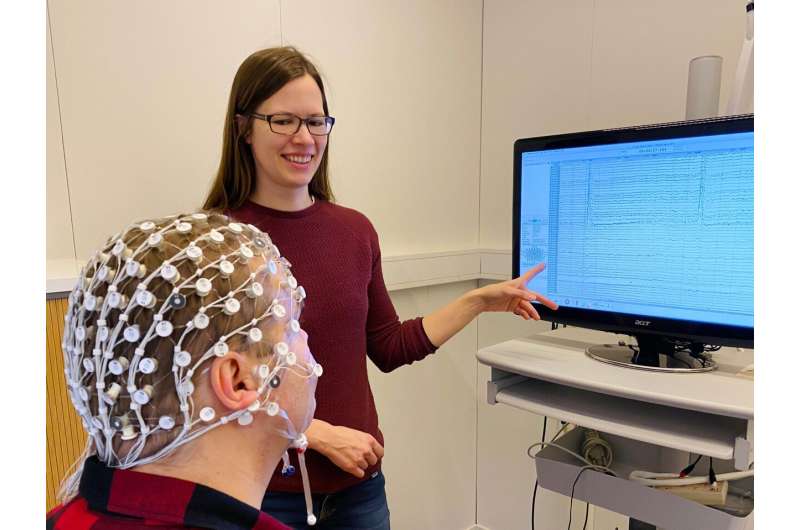Elisa Ruohonen in the research laboratory. Photographer Xueqiao Li. Credit: University of Jyväskylä
Depression has been associated with bias in the processing of emotional information. Studies have for example, shown, that depressed individuals attend to negative stimuli, interpret neutral faces as sad and have enhanced recall for negative words. However, the bias in automatic information processing has been less studied.
In a recently published study conducted at the Department of Psychology at the University of Jyväskylä, emotional information processing was examined in depressed and non-depressed participants. Electrical brain responses (EEG) were recorded while the participants passively viewed pictures of facial expressions. The depressed were found to have larger brain responses to sad faces compared to neutral faces.
"The results indicate that the depression-related bias in the processing of sad facial expressions is present already in the early and automatic phase of information processing," says doctoral student Elisa Ruohonen from the University of Jyväskylä. "It is important to study the automatic processing phase, because the brain constantly encodes stimuli that are outside of the conscious attention."
The stableness of the negative bias was investigated by examining the brain responses in a three-year follow-up study. During the follow-up period, the depressed participants were offered a short psychological intervention. The depression symptoms were found to be decreased in the follow-up while the negative bias was also reduced. The stableness of the negative bias has been debated and it has been even suggested as a permanent trait in depression.
"Our results show, that the negative bias can be reduced. This finding could have significance considering depression treatment. However, more research is needed to confirm whether the bias is a cause or a symptom of depression," says Ruohonen.
The study was novel in combining brain research and clinical treatment research in a follow-up design. Long-term follow-up studies are rarely conducted, especially in brain research.
"Long-term follow-up studies give important insights, since many studies on treatment effects only focus on short-term outcomes," says Ruohonen. "It is known that depression is often long-lasting and a highly recurrent disorder. By combining brain research and treatment research, we hope to get information that can aid in evaluating treatment response and revealing the causal mechanisms of depression."
Depression is a heterogeneous disorder and multiple causal pathways can lead to it. One goal of the brain research is to gain knowledge that could be used to plan individual treatments for depression.
"We aim to find brain response markers that could be used to predict treatment response," explains Ruohonen. "It is important to take into account the heterogeneity of depression and individual factors that could affect treatment response. One study focus could be to investigate whether depressed participants that have stronger negative bias benefit from treatment that specifically targets this bias."
More information: Elisa M. Ruohonen et al. Event-related potentials to task-irrelevant sad faces as a state marker of depression, Biological Psychology (2019). DOI: 10.1016/j.biopsycho.2019.107806
Provided by University of Jyväskylä























